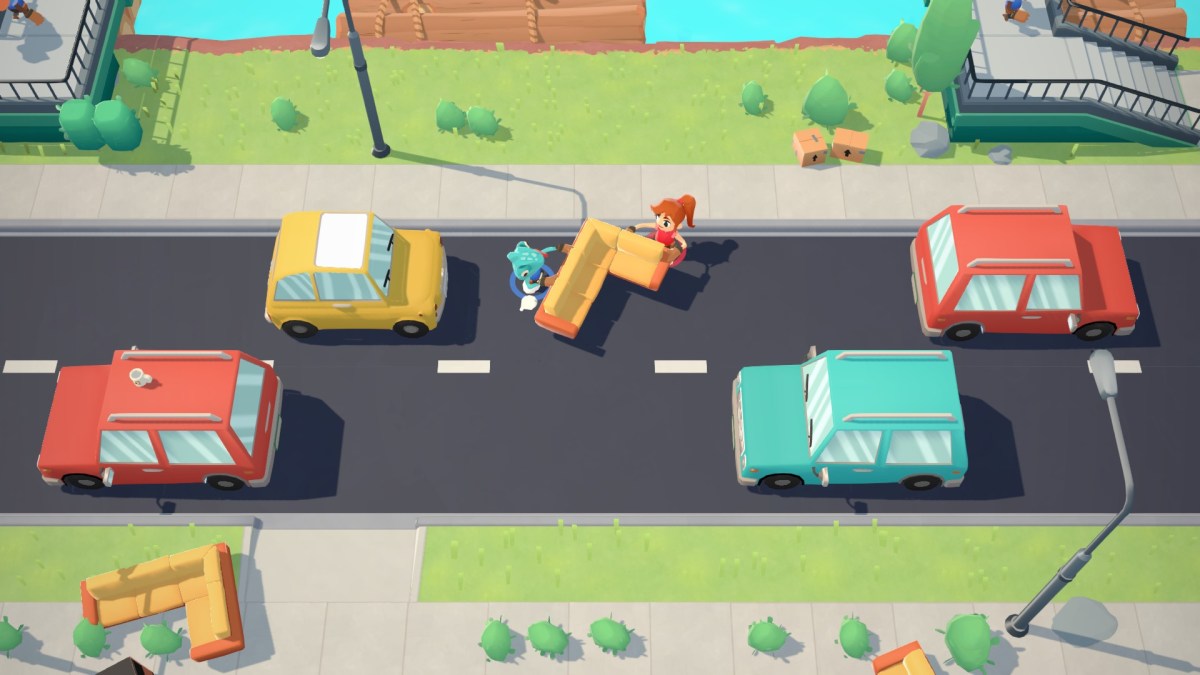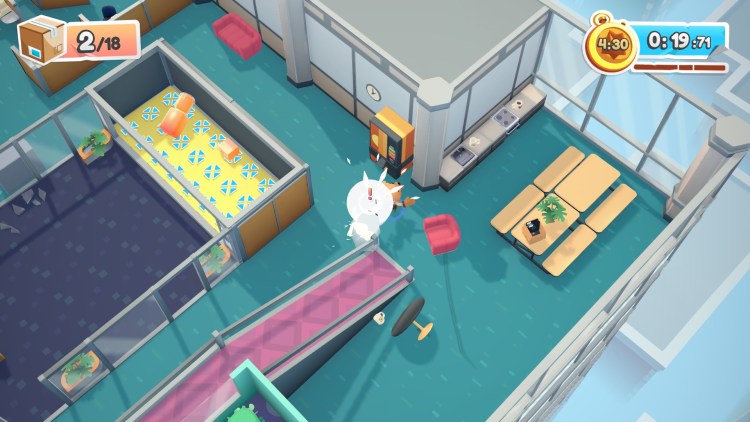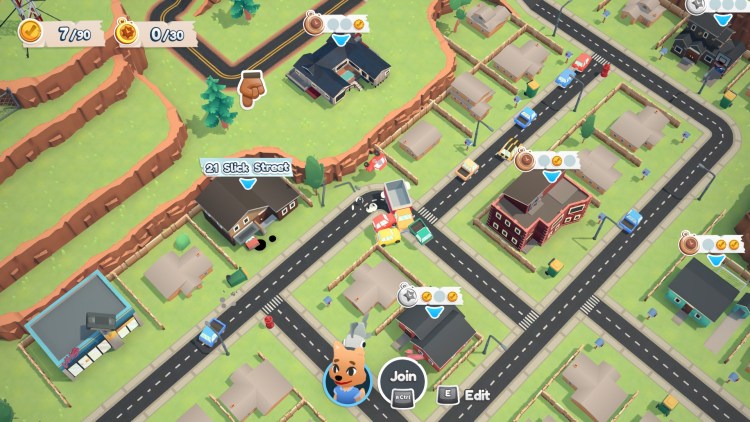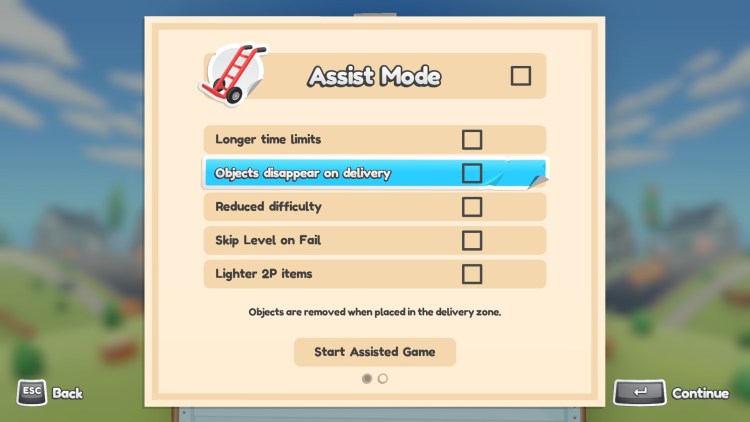Nothing says hard work like hours upon hours of grueling manual labor. Over in our cruel reality, the very thought of carrying furniture sends shivers down our spines, just before the actual act sends jolts of pain right back up. For the employees over at Smooth Moves, tearing muscle fibers lugging fridges 24/7 is a dream come true — and for good reason. As Furniture Arrangement and Relocation Technicians (FART for short), employees are taught the ancient art of valuing fun over safety. In Moving Out, furniture is expendable; friends are forever.
Moving couches cooperatively
Moving Out is a couch co-op game that invites up to four players to join in on the mayhem. In the town of Packmore, where bizarre buildings are bountiful, your party must carry, throw, wrangle, and smash their way through timed challenges. Amidst the destruction of property and lighthearted humor is an addicting gameplay loop made more enjoyable by friends and funky physics.
The colorful, chunky visual aesthetic and upbeat grooves set a familiar tone, as does the cooperative, teamwork-driven gameplay. It’s hard to ignore the obvious Overcooked inspiration; Moving Out wears its inspirations on its sleeve, but it is very much its own beast. In its lane of very stressful stress relievers, Moving Out reigns supreme. The game never failed to put a smile on my face with its awkward one-liners or its adorkable cast of characters, nor did it fail to tighten my white-knuckled controller grip every time a bed needed to be squeezed through a doorway.
First day on the job
As a mover, your job is to raid customers’ homes and work your way through a checklist of items to bring back to your truck dead or alive. Larger objects demand multiple players working together to lift, while smaller ones can be carried individually or even thrown. Each home you visit is a flexible, timed puzzle that forces your team to strategize. Learning the most effective routes, roles, and carrying order is all part of job.
Even after you’ve mastered the art of whipping furniture out of second-story windows, there’s still the matter of organizing the truck bed. Moving Out offers surprisingly depth, and each level’s time restraints bring its complexities to the surface. Additional curve balls like live cargo, oil slicks, and even ghosts ensure that no two levels are even remotely the same.
One common thread unifying each level is the immense satisfaction of being thrown around by the weight of a CRT TV. Learning how to make an object’s weight work for you is part of the journey to mover mastery. This is especially true when navigating tight spaces or when loading the truck. Approaching at the improper angle could spell disaster for your otherwise flawless run. Moving Out’s physics is a character all in its own — reliable, entertaining, but difficult to tame.
Employee of the month
Gold, silver, and bronze medals are awarded for completing moves with haste, while bonus challenges reward thoughtful exploration of the game’s levels and mechanics. Moving Out actively encourages the discovery of new play styles by dishing out rewards for completing its side objectives. New minigames can be unlocked at the Packmore Arcade after reaching certain bonus objective milestones — each one focused on polishing your couch-carrying skills. Additional characters also become available as you clear out more and more homes.
The arcade, as well as new levels, can be accessed through the game’s overworld. Much like in Overcooked, you and your friends can drive your truck around town, with a chaotic twist. Cause huge car pileups, destroy private property, and disturb the peace! That frenetic furniture-flinging experience permeates every facet of Moving Out, showcasing its commitment to chaos.
Teamwork makes the dream work
But chaos is linked to player count. Enjoying Moving Out solo is one thing, but with friends, the realm of possibility grows tenfold. Tackling houses with additional players changes the furniture and temporal parameters of the levels, but the amount of new tactics at your disposal more than makes up for the difference. Why walk a fragile box down the stairs when you can toss it through a glass window and have a friend catch it?
Early levels place less of an emphasis on teamwork, but those mid-game golds and beyond are reserved for well-oiled machines. Sometimes a single successful catch is all you need to close the gap between silver and gold. Having an extra player to rid the path to the truck of obstructions or help wriggle a couch through a tight gap is priceless. It takes a team to get to most out of Moving Out’s mechanics.
The more the merrier
Having a pair of helping hands also reduces the likelihood of falling victim to the game’s pesky colliders. Even the smallest, lightest objects or protrusions can stop you in your tracks. On rare occasions, furniture can lock together and impede progress indefinitely. Having friends to move furniture out of the way isn’t an optimal solution for this, but you’re bound to salvage a few runs together like that.
For players looking for a little more to overcome Moving Out’s challenges, an assist mode is available. While the options aren’t quite as robust as Celeste’s now-famous assist mode, they are undoubtedly lifesavers for someone struggling. There, you can adjust the weight of furniture, extend time limits, and more.
The assist mode is but one of the game’s many features designed to promote inclusivity and accessibility. For the visually impaired, the ability to scale the UI is available, alongside an option for dyslexia-friendly text. There’s even a customization option for wheelchairs! In a game all about cooperation and friendship, it never hurts to be inclusive.
Packing it up
Moving Out nurtures the very thing that makes couch co-op fun: friendship. Its vibrant presentation and spontaneous, comedic gameplay lend themselves to wacky bouts of emergent gameplay moments. The more you and your friends work together to explore its deep yet intuitive systems, the more Moving Out rewards you.












Published: Apr 23, 2020 02:00 pm